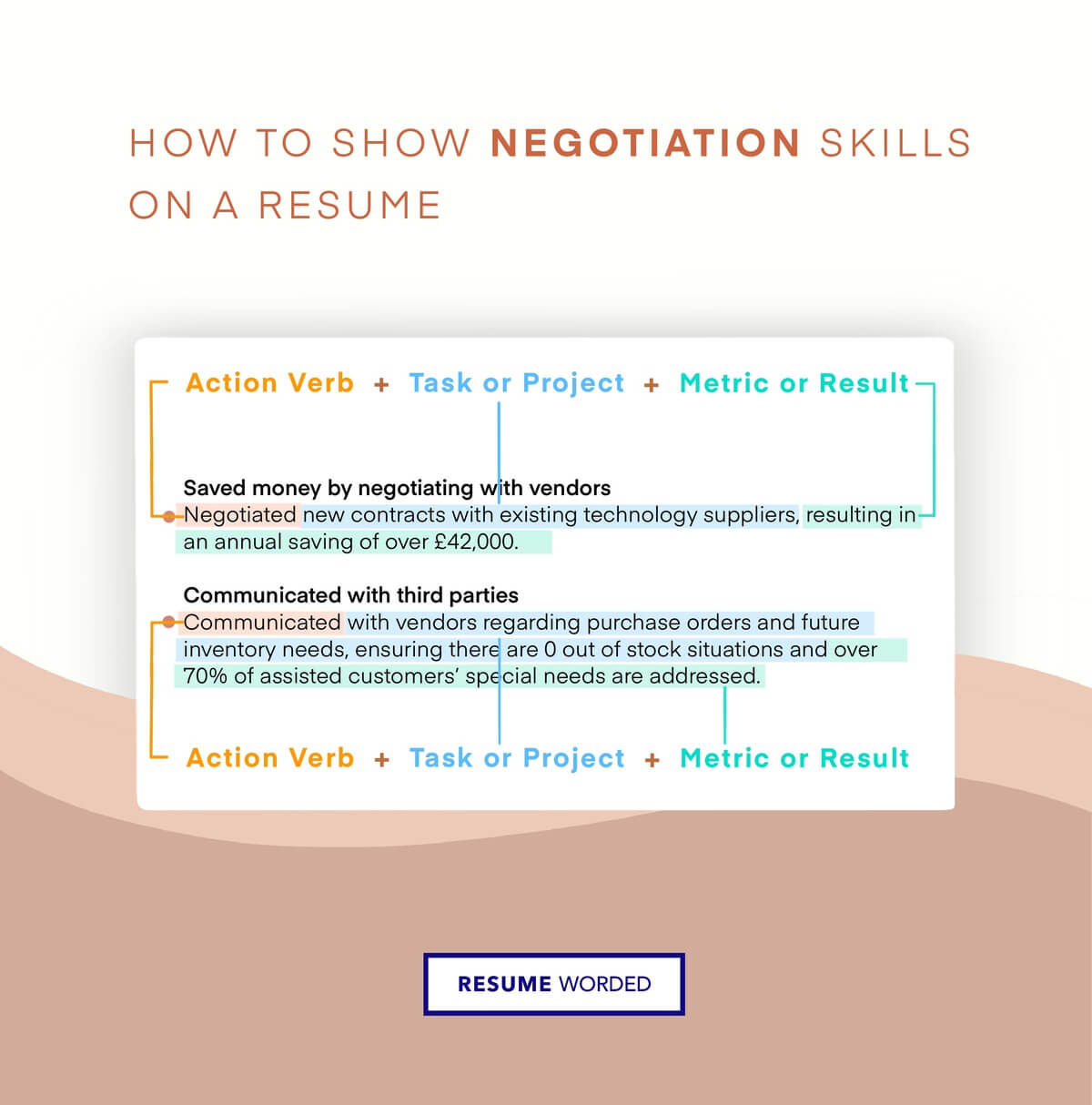Resume Synonyms for Negotiate
Want another word for Negotiate to use on your resume? Our team's compiled the most effective action verbs and synonyms you can use instead of the overused resume phrase, "Negotiate".
Want another word for Negotiate to use on your resume? Our team's compiled the most effective action verbs and synonyms you can use instead of the overused resume phrase, "Negotiate".
In many industries, negotiating is a critical skill. It shows that you're able to work with other people to achieve a common goal. When applying for a new job, you must show the skills that make you unique and valuable—and the present tense verb 'negotiate' is one way to do so!
Negotiation takes a lot of time and energy, and it's not something everyone wants to do—but when you have that skill, it puts you ahead of most applicants. However, the word 'negotiate' can be a problem to use repeatedly in your resume because it can sound redundant and make you seem like you're trying too hard to sell yourself.
It's good to use synonyms for 'negotiate' to avoid redundancy. Also, using the verb's past tense is suitable when detailing your past roles. For example, instead of saying 'negotiate,' say 'proposed', 'intermediated', or 'settled'.
Using synonyms will help keep your resume from sounding repetitive and effectively describe what you did at different points. It also helps demonstrate your skills in a more specific way so hiring managers can see how well-suited you would be for the position they're hiring for—someone who can work with others to reach the desired outcome.
I've compiled some synonyms you can use instead of Negotiate on your resume, followed by real examples I've written for clients (feel free to use them!).
Let's look at examples of how you can remove and replace the overused phrase, Negotiate, with a stronger synonym and alternative that is more effective at highlighting your achievements.
• costs for housing contracts
After: Using a stronger synonym• costs for housing projects by 30% through negotiating contracts and comparing costs of procurement. .
• company merger
After: Merged• a company merger by establishing cross-functional communication, leading to an increase of 15% in enterprise value within the first quarter.
The verb 'Spearheaded' is more descriptive and demonstrates leadership. The improved bullet point further emphasizes the candidates' role and the specific impact they had, providing tangible evidence of their influence.
Tip: I've prepared a ton of additional examples for you to give you inspiration. Please click on any of the following to expand and see real examples of how I've rewritten client bullet points.
We've put together an infographic to give you more examples of how to put this into practice. Note the use of strong action verbs instead of words like Negotiate.

• a cross-functional team of 10 in 3 locations (London, Mumbai and New York), ranging from entry-level to Ph.D. analysts, and closely collaborated with business development, data analysis, operations and marketing teams.
• integration with existing systems by creating tool that extracts metadata from images and provides metadata to a system-wide search database..
• a team of four developers and two designers to implement and launch online marketplace that connects students with tutors, within 6 months.
• to Associate Consultant in 2 years (1 year in advance); the only member in a cohort of 45 Analysts to be fast-tracked.
• company's 24-month sales results to develop five-year monthly projections by revenue and customer type.
• private equity due diligence in $400M portfolio. Performed strategic and analytical valuation of assets based on interviews with experts and created extensive models of the industries; persuaded client to move forward with acquisition.
Instead of passive phrases like Negotiate, use other words like Bargained, Lobbied, Networked, Liaised, Contracted or Settled. Using these verbs will help your accomplishments and bullet points stand out on your resume.
Synonyms you can use instead of the overused phrase Negotiate include:
As a next step, I'd recommend going through each of your resume's verbs and improving each one with stronger action verbs. The most effective way to do that is by uploading your resume to tool below. It'll tell you which parts of your resume need work, so you can improve them before a recruiter rejects you for them.
Get expert feedback on your resume, instantly. Our free AI-powered resume checker scores your resume on key criteria recruiters and hiring managers look for. Get actionable steps to revamp your resume and land more interviews.
Upload Resume
"My free resume review was truly eye-opening. I found out why I wasn't getting interviews and exactly what to add to get past resume screeners. I've already had way more callbacks since I used it. I recommend it to all my friends who are job searching."

"Probably the best thing I've done this year. Showed me what my strengths were and the jobs and industries I should be focusing on. The most impactful part though was how it identified this spiral I'd been doing subconsciously - yikes, freakishly accurate."

Thank you for the checklist! I realized I was making so many mistakes on my resume that I've now fixed. I'm much more confident in my resume now.